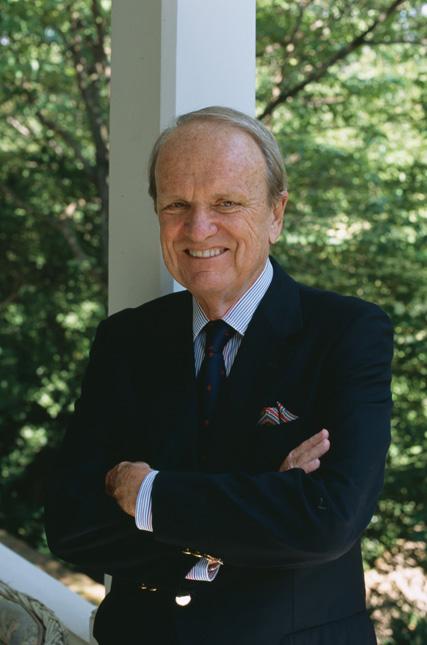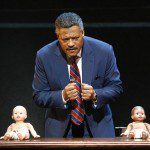Justice is Served in Stevens’ ‘Thurgood’
By • November 3, 2011 0 1149

If ever there was a moment in the theater that you could without a doubt call a real Washington moment, it occurred at the Kennedy Center’s Eisenhower Theater on June 1, the opening night of “Thurgood.”
Here, at the end, taking bows was American Film Institute Founder, filmmaker and television director George Stevens, Jr., the author of the one-man biographical play about the legendary first African American Supreme Court Justice Thurgood Marshall.
Right next to him was actor Laurence Fishburne who, during the course of the play, simply disappeared and all but resurrected the grand civil rights warrior Marshall up close and personal.
There in the audience was Marshall’s widow, his two sons and enough Supreme Court justices to at least make a singing group: Chief Justice John Roberts, Stephen Bryer and Ruth Bader Ginsburg, not to mention Washington insider and civil rights leader Vernon Jordan, who is a producer for the show.
Did we forget to mention that the timing couldn’t be more historically atmospheric? By now, everyone knows that Elena Kagan, President Barack Obama’s choice to fill the seat of retiring Justice John Paul Stevens, was a clerk for Marshall.
It doesn’t get any more Washington than that.
“For me, it’s so gratifying, so appropriate to bring this play to the Kennedy Center,” Stevens said in an interview with the Georgetowner. “This is where Marshall accomplished so much, it’s where he was a giant in front of the Supreme Court, arguing the Board of Education versus Brown case, and on the court as a major force.”
Stevens, the son of the late Oscar-winning director George Stevens, is himself a noted film director of major, much-talked-about television mini-series and documentaries. He’s a man whose life has been split between Hollywood and Washington, where he began his career being asked to work on the film division of the U.S. Information Agency in the early 1960s. A long-time Georgetown resident, he’s also the founder of the American Film Institute and producer of the Kennedy Center Honors.
A strong streak of fairness for outsiders runs through much of Stevens’ own work, including the mini-series “The Murder of Mary Phagan” and “Separate But Equal,” the 1991 mini-series about the 1957 Brown vs. Board of Education case which starred Sidney Poitier as Marshall and Burt Lancaster as the opposition attorney.
“I think a lot of that came from my father,” Stevens said. “If you look at his major works after the war — which changed him tremendously — there is a strong sense of justice and fairness in his films like ‘Giant’ and ‘The Diary of Anne Frank.'”
“When we did ‘Separate but Equal’ I thought a lot about the possibility of writing a play, but not a narrative drama necessarily,” he said. “The film was about a specific historical event. The play is Thurgood Marshall in full, so to speak. I wanted people to see the human being who was so important to the events and history of his time. I didn’t want people to go to the play so that they could feel good, to have a good moral feeling, with nothing but factual incidents.
“Laurence is perfect in the part,” he said. “When it debuted in New York in 2008, Marshall’s wife was in the audience. She loved Fishburne’s performance and kidded him, saying ‘I wish you weren’t married.’”
What Fishburne, who has a persona, voice and track record that’s instantly recognizable (Three “Matrix” films, the lead role in the current “CSI” series), does in “Thurgood” is to bury himself in the man. The characteristic Fishburne voice is gone, and what’s left of it has an old man’s grunt and growl to it.
“He’s also very funny,” Stevens said. “People are surprised that there are so many humorous moments.”
The conceit of the play is that it’s a rather casual address made by Marshall to a law school class at Howard, where he went to school, talking about his life and work, growing up, taking on cases that broke the all-white spell at the University of Maryland law school, taking on voting rights cases in Texas, meeting his first wife (who passed away) and his second wife, taking on the Board of Education case, the legal strategies and his ascent to the high court, which includes memorable stories about LBJ.
So emphatic and vivid is Fishburne that the arrival of a number of late-comers (because of traffic snarls on opening night) folded right in as Thurgood Marshall welcomed them warmly.
Stevens, meantime, is busy on his next project.
“You’ll like this one,” he said. “It’s called “Herblock of N Street.”
That would be Herblock, the late, great Pulitzer Prize-winning political cartoonist of the Washington Post.
We can’t wait.
“Thurgood” runs at the Kennedy Center’s Eisenhower Theater through June 20.
- George Stevens, Jr. | Diana Walker



